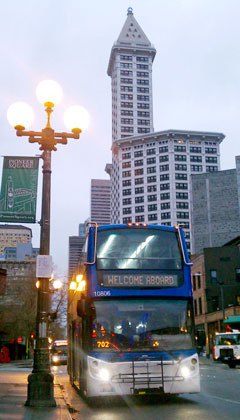MARYSIVLLE — Marysville residents might have needed a double-take Thursday evening when Community Transit’s new double-decker bus drove through town on its way to the Cedar and Grove Park and Ride on its first day in service.
It is the first of 23 new Double Tall buses that will be added to CT’s fleet this spring.
The Double Tall buses are 42 feet long and 14 feet tall. They seat 77 passengers – 49 upstairs and 28 downstairs – plus have designated standing room. The Double Talls will seat more passengers than the buses they are replacing, easing the crowding on popular commuter buses. The smaller footprint of the bus saves room on the roads and the agency’s base. They also require less maintenance and use less fuel than the buses they are replacing, which will save money.
The buses, which were paid for largely thanks to a federal stimulus grant, will replace some of the agency’s oldest buses.
“The Double Talls are popular and practical, and we are excited to be the first transit agency in the Northwest to put them into regular service,” said Community Transit CEO Joyce Eleanor.
Community Transit leased a double-decker bus from 2007 to 2009 to gauge its practicality as a regular commuter bus. The bus transported more people for the same cost as an articulated bus, with fewer maintenance and operational concerns. Riders regularly followed the leased bus around to get an opportunity to ride The Double Tall.
“While these buses have a striking appearance and the views from the top floor are amazing, we are excited because the Double Talls allow us to make much-needed updates to our fleet and improve our productivity,” said Eleanor.
The Double Talls are made by Alexander Dennis Ltd., the same company that makes the famous London double-deckers. Community Transit’s decision to buy these buses encouraged the Scotland-based bus manufacturer to develop a plant in the United States so the buses could meet federal Buy America standards, which was required by the federal stimulus grant.



